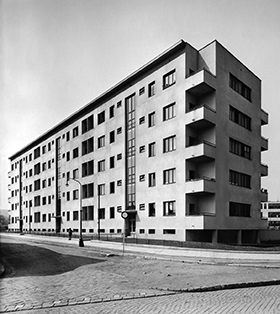
The housing support law could target more people
 |
| Josef Polášek: City small housing buildings, Brno-Náplavka, 1939 |
Due to the elections to the Chamber of Deputies scheduled for the beginning of October, it is practically certain that the deputies will not have time to discuss the proposal. There are no meetings planned during the holidays, and the meeting hall is under renovation. If the deputies manage to meet before the elections, it will likely be in September.
The housing support law is primarily intended to help people threatened by housing distress. For instance, it establishes networks of contact points that will provide advice aimed at preventing loss of housing. A voluntary guarantee system for private apartment owners, known as guaranteed housing, and financial contributions for municipalities that rent their apartments to people in housing distress will also be created. The proposal that the law should assist households with incomes up to 1.43 times the minimum living standard was previously suggested by deputy Jiří Havránek (ODS). However, this move was labeled as one of the issues threatening the functionality of the law by a group of experts from the initiative "For Housing." According to the initiative, the parameter is too strict, and thus a significant portion of the population threatened by housing distress will not be able to utilize the assistance.
The currently set value of 1.43 times the minimum living standard has excluded an estimated third of people in housing distress from the support system of the housing support law, according to the explanatory report. According to the Ministry for Regional Development (MMR), which is the proponent of the legislative adjustment, the current limit excludes the possibility of support for working households with employed members, seniors, and persons with disabilities.
Thanks to the increase of the minimum living standard multiple to 1.6, the target group of recipients of housing support measures will, according to the ministry, be expanded to include working individuals living in unsuitable conditions. Such individuals include working single mothers living in lodging houses, as well as seniors receiving pensions over 10,000 crowns, and persons with a third-degree disability pension.
The proposed law does not increase the amount of the contribution for intermediating supportive measures, and the financial impact of the change on the budget depends on the number of apartments put into the housing support system by private owners and municipalities. According to the explanatory report, the increase in the limit would only slightly expand the target group eligible for assistance. According to optimistic estimates, the share of eligible households seeking support could increase by 6,000 to 48,000. Such a limited expansion of the target group may have only a marginal impact on the budget according to the explanatory report.
The English translation is powered by AI tool. Switch to Czech to view the original text source.
1 comment
add comment
Subject
Author
Date
, a kteří zároveň ....
Pavel Juráček
17.08.25 09:47
show all comments
Related articles
0
06.08.2025 | MMR has once again eased the conditions for subsidies for social housing, with 530 million CZK available
0
16.04.2025 | Experts welcome the adoption of the housing support law, they wanted a more progressive form
0
21.02.2025 | The Lidovci will demand an increase in the allocated amount for the construction of affordable housing
0
07.02.2025 | Support for the construction of affordable housing has been requested by 92 projects for CZK 5.1 billion
0
26.10.2024 | About the funding for the construction of affordable housing, 70% of municipalities are interested
0
05.09.2024 | The Committee for Public Administration has suspended the discussion on the housing support bill
0
04.09.2024 | Bartoš does not expect that the government would not release funds for the construction of affordable housing
0
25.07.2024 | The government approved a program to support investments in affordable housing
0
12.06.2024 | The government approved the law on housing support, which is meant to protect people at risk of housing distress
1
17.05.2024 | Bartoš believes that the government will ultimately approve the housing support law
0
15.05.2024 | The government today interrupted the discussions on the housing support law, discrepancies persist
0
24.05.2023 | The Housing Support Act will go into public consultation next week
0
04.05.2023 | In the Czech Republic, according to the Constitutional Court, there is a lack of a law on social housing; it is said to be an unsustainable situation
0
11.10.2018 | Dostálová: Preparations for the housing law would delay assistance
0
30.12.2016 | MPSV must submit the law on social housing
0
07.06.2016 | The Ministry of Regional Development has more than a billion for the support of social housing
0
12.04.2016 | Social housing needs at least 181,000 households
0
22.09.2015 | <MPSV>Investment in the creation of social housing would be 3 billion per year</MPSV>
0
07.04.2014 | The Social Housing Act could be adopted sooner than in 2.5 years









